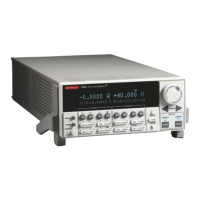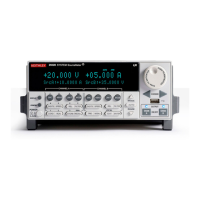Model 2657A High Power System SourceMeter® Instrument Reference Manual Section 7: TSP command reference
2657A-901-01 Rev. B/December 2012 7-161
script.newautorun()
This function is identical to the script.new() function, but it creates a script with the autorun attribute set to
"yes".
Type TSP-Link accessible
Affected by Where saved Default value
Function No
Usage
scriptVar = script.newautorun(code)
scriptVar = script.newautorun(code, name)
scriptVar
The name of the variable that will reference the script
code
A string containing the body of the script
name
The name of the script
Details
The script.newautorun() function is identical to the script.new()function, except that the autorun
attribute of the script is set to yes. The script is also automatically run immediately after it is created.
Example
NewAuto = script.newautorun("print('Hello from new auto run command')",
'NewAuto')
print(NewAuto.autorun)
print(NewAuto.name)
Creates a new script called NewAuto that automatically has the autorun attribute set to yes after it is
created. The name attribute's value is set to "NewAuto".
Output:
Hello from new auto run command
yes
NewAuto
Also see
Create a script using the script.new() command (on page 6-39)
Global variables and the script.user.scripts table
(on page 6-38)
Named scripts
(on page 6-4)
script.new()
(on page 7-160)
scriptVar.save()
(on page 7-167)
script.restore()
This function restores a script that was removed from the run-time environment.
Type TSP-Link accessible
Affected by Where saved Default value
Function No
Usage
script.restore(name)
name
The name of the script to be restored
